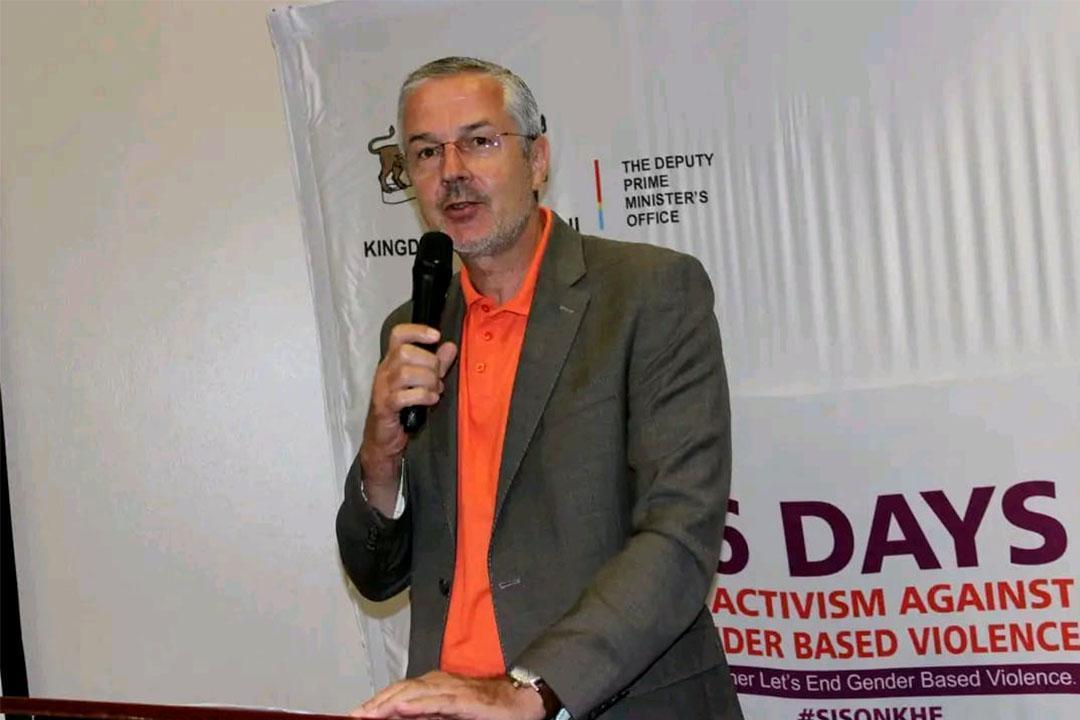Africa-Press – Eswatini. The European Union (EU) in Eswatini has issued a firm condemnation of all forms of violence against women and girls, describing such acts as gross human rights violations that demand urgent, coordinated and sustained action.
This position was strongly articulated by EU Ambassador to Eswatini, Karsten Mecklenburg, during the official launch of the 16 Days of Activism Against Gender-Based Violence held on 24 November 2025 at Royal Villas, Ezulwini.
The event, organised by UNFPA Eswatini in partnership with the Government of Eswatini, the EU and various civil society stakeholders, also marked the unveiling of the Hlonipheka – Thriving for Dignity Programme. The initiative, co-funded by the EU and implemented by UNFPA, focuses on supporting vulnerable groups including survivors of gender-based violence and persons with disabilities by expanding access to dignity, protection and essential support services.
Ambassador Mecklenburg emphasised that violence against women and girls remains one of the most pervasive human rights violations, undermining equality, development and social stability. He stated that the issue requires “collective resolve, strengthened legislation and the effective enforcement of laws designed to protect those most at risk”.
This year’s global campaign is observed under the theme Unite to End Digital Violence Against All Women and Girls, reflecting the growing concerns surrounding online forms of abuse. These include cyberbullying, cyberstalking, online harassment, gendered disinformation, and the non-consensual sharing of intimate images. Such violations, the EU noted, are equally harmful as physical or emotional abuse and are increasingly affecting women and girls across digital platforms.
The Ambassador stressed that the rapid expansion of technology has created new avenues for violence, making digital safety a matter of urgent national and global importance. He underscored the need for communities to equip women, girls, boys and men with the knowledge and digital literacy required to protect themselves online and to recognise emerging risks.
“Digital violence cannot be dismissed as virtual or less damaging,” he said. “It causes real harm, threatens mental health, compromises safety and silences women and girls. Addressing it is essential to ensuring equality and safeguarding human rights.”
The launch also reiterated the importance of prevention efforts rooted in social responsibility, including promoting respect, positive masculinity and non-violent conflict resolution. Speakers highlighted the need to challenge harmful norms, break the culture of silence, and ensure that survivors feel supported and able to report abuse without fear of stigma or retaliation.
Collaborating partners present at the launch included the European Union in Eswatini, UNFPA Eswatini, UNDP Eswatini, Swaziland Action Group Against Abuse (SWAGAA), SOS Children’s Villages Eswatini and several other organisations working within the gender justice sector.
The 16 Days of Activism campaign, observed annually from 25 November to 10 December, continues to serve as a global platform to raise awareness, strengthen advocacy and mobilise action to end gender-based violence in all its forms.
For More News And Analysis About Eswatini Follow Africa-Press







